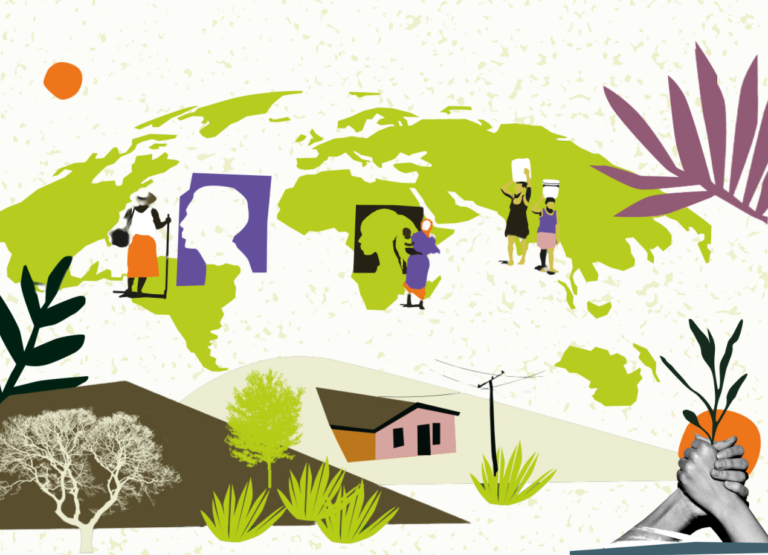Leaders from Alianza highlight the power of local funds and present four strategic commitments.

2025 began with serious blows to international philanthropy. The abrupt changes introduced by the new U.S. administration sent shockwaves across the global funding landscape. In an increasingly polarized geopolitical context, international cooperation is being deprioritized, and the mechanisms of global solidarity are weakening. Multilateral agreements are under siege, and coordinated responses to urgent social, environmental, and humanitarian crises are being dismantled.
For those working within and alongside civil society in the Global South, the immediate impacts of this global reconfiguration are undeniable. Organizations that have long depended on traditional streams of international aid now find themselves in precarious financial positions.
Rethinking Power, Funding, and Position
In the landscape of global philanthropy, funds rooted in the Global South are facing a pivotal moment that demands a redefinition of how they operate and how they are perceived. As these organizations grow in influence and scale, they are navigating persistent funding dependencies, contested narratives about their roles, and the urgency of building more autonomous and locally grounded systems.
A core tension lies in the concentration of funding sources. Many southern-led funds still rely heavily on donors from the Global North. This dependency not only creates financial vulnerability but also raises deeper questions of identity and power.
Diversifying income streams, particularly by cultivating national and local support, emerges as a key strategy for sustainability and legitimacy, connection, and influence within local societies. The goal is not to abandon international funding but to balance sources.
Developing domestic giving structures is a long-term, generational endeavor. It requires shifting public narratives, investing in civic engagement, and embedding philanthropy into local cultural frameworks. Local funds have been on this path for decades, demonstrating resilience and adaptability, yet local funding still makes up only a small portion of their budgets. The challenge is real—but so is the opportunity.
This financial conversation is inseparable from the question of perception. Local funds are often categorized as “intermediaries”—a label that implies they simply channel money from one actor to another. While the term may describe a function, it fails to reflect the true scope and value of their work. These funds are not just pass-through entities; they are political actors, movement builders, knowledge holders, and long-term partners of grassroots organizations. Their proximity to local communities enables a kind of accompaniment that larger international institutions rarely match.
It is necessary to move beyond narratives that place local funds in a secondary position. In practice, they often represent the most scalable and resilient infrastructure to ensure that resources reach where they are most needed: in the hands of communities that have defended their territories for generations.
Yet these communities have historically been treated only as beneficiaries—not as protagonists. They are often excluded from high-level decision-making spaces and remain underappreciated in global funding architectures. Local funds have been instrumental in shifting this dynamic—bringing visibility to these communities, supporting their engagement, and advocating for their autonomy.
Navigating new barriers
Another point of concern is the increasing complexity of global regulations. Today, organizations face not only political obstacles but also financial and administrative hurdles when moving resources. This demands constant updating and institutional strengthening to navigate new legal and operational requirements that, if misunderstood, can paralyze the flow of support to those who need it most.
Given this scenario, it becomes clear that the sustainability of Global South organizations depends on strategic action on multiple fronts. One of these is ensuring our active presence in key decision-making spaces. Too often, locally rooted funds—despite being best positioned to scale solutions in our regions—are excluded from the very arenas where global strategies and funding flows are defined. If we are not present, others will define the solutions for us. That is why our work must also include mapping and understanding power structures, keeping our radar on to identify where we need to be, and making sure our voices are heard.
Equally essential is strengthening alliances—networks that challenge old hierarchies and reimagine collaboration beyond borders. These partnerships are not just about raising more money. They are about reshaping power, expanding political voice, and creating new platforms for action and visibility.
The path is long, but it is being walked. Local funds are navigating uncertainty with vision, forging alliances with purpose, and reshaping philanthropy to a model centred on territory, justice, and autonomy.
Reflections from the Field: Reframing Strategies
This reflection is grounded in a conversation among three of the most experienced voices within the Alianza Fondos del Sur: Cristi Nozawa (Samdhana Institute), Artemisa Castro (Fondo Acción Solidaria – FASOL), and Maria Amália Souza (Casa Socio-Environmental Fund). As founders and long-standing leaders in the network, their insights illuminate where we are and where we must go. Their collective experience, spanning decades of local grantmaking, offers both strategic clarity and political urgency.
That these voices converge within the same alliance speaks to the political force and the deep sense of mutual support that Alianza Fondos del Sur embodies: more than a network, a collective movement rooted in the South.
Shaping Change from the South: Four Commitments for a Shifting Landscape
As global philanthropic structures undergo significant transformations, the question is not whether change will happen—but who will shape it. This uncertainty is also an opening for those working to transform the philanthropic landscape from the Global South: a chance to shift the power and build systems rooted in justice, autonomy, and proximity.
Moving from reflection to action, four strategic commitments emerge:
Diversifying funding sources, with a special focus on fostering national-level funding within countries of the Global South.
Challenging misconceptions about local funds, asserting their political role and systemic value.
Engaging in strategic global discussions, mapping power structures and ensuring southern voices are present.
Strengthening alliances within the Global South as platforms for collaboration, influence, and mutual support.

